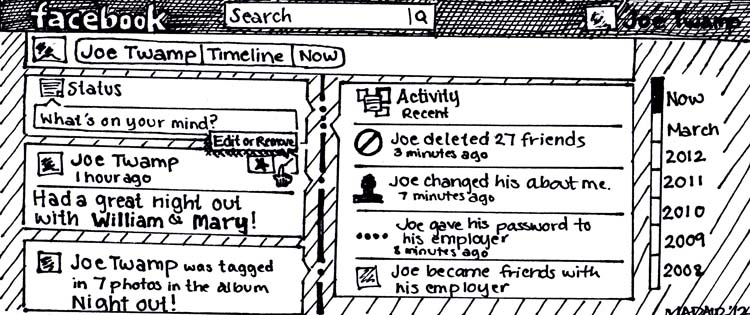As the impending date of graduation looms closer, the first thought on the minds of many seniors at the College of William and Mary is getting a job. In an economy that is still struggling, employment right out of college is often hard to find — we’re looking at you, humanities majors. Students are often willing to agree to almost any terms in order to ensure that they have at least some form of a paycheck. New policies that enable employers to require Facebook login information from applicants seem to push the limit on how much new graduates should give up in exchange for a job.
Every student at the College probably heard the lecture: Don’t put anything on Facebook that you wouldn’t want an employer to see. There is merit to this argument, and students should acknowledge the fact that anything they put online is fair game. Even so, asking applicants to surrender their passwords clearly oversteps privacy bounds.
Giving employers access to Facebook passwords could allow them to rifle through private messages and even to make changes to accounts. Private messages on Facebook are no different than personal email accounts, and this practice creates a precedent on which employers could begin to ask for those passwords as well. Furthermore, by viewing information that the applicant may have made private, such as sexual orientation and religious or political views, employers create the opportunity for discrimination charges that will only hurt their companies.
Social media revolves around creating an online persona. The decisions a user makes concerning what information to make public and what to keep hidden says a lot about the user’s judgment. By viewing applicants’s public profiles, rather than private information, employers can see how applicants wish to represent themselves, in the same way they would in an interview. This should create a clear image of what type of employee that person will be.
As social media continues to grow and expand, from Pinterest to Twitter to Tumblr, this issue will become an even more pressing matter and one that needs to be addressed. Because Facebook is an international website, there is a blurred line about who should have the jurisdiction to decide whether or not forcing employees to hand over passwords is permissible. Facebook’s policy forbids users to give their account information to others, but employers clearly are not paying any attention. In order to prevent this invasion of privacy, the Federal Communication Commission needs to ban this practice, even if it only has jurisdiction in the United States. This regulation would be the first step to ensuring that employers don’t bully job applicants into handing over their passwords.
Students should know that employers will probably look at their Facebook profiles when reviewing their applications, and they should use discretion when deciding whether or not it is a good idea to upload those pictures from the past weekend. At the end of the day, however, employers should only be able to make their decisions based on the information that applicants allow them to see so that applicants’s privacy can be protected.

